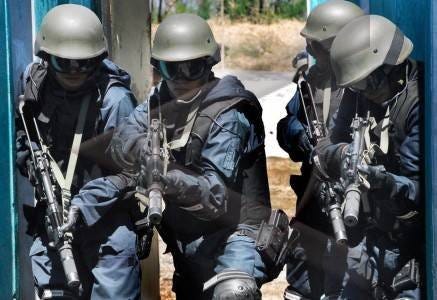Foiled terror attack targeted Indonesian police during Ramadan; cell members' roles exposed
Their roles include gunmaking, providing safehouses, intelligence gathering and recruitment.

JAKARTA: Indonesia’s antiterror operations earlier this month that killed two suspected Jemaah Islamiyah members and arrested another four had thwarted a revenge attack using firearms against police during Ramadan by the cell members each of whom had their specific roles including gunmaking, providing safehouses, intelligence gathering and recruitment, an Indonesian government-linked terrorism researcher has told me.
Indonesia’s counterterror police force Densus 88 earlier this month said the six were linked with Jemaah Islamiyah (JI), an al-Qaeda-linked regional terror group blamed for the deadly 2002 Bali bombings that killed 202 people and the 2003 JW Marriott Hotel suicide bombing in Jakarta that killed 13.
The six JI members were known to have sheltered Zulkarnaen, a mastermind of the Bali bombings, who had been elusive for some 18 years before his eventual arrest in Lampung province in Sumatra in 2020. Zulkarnaen was sentenced to 15 years’ imprisonment in 2022.
The shootouts between Densus 88 and the six JI men occurred on two separate occasions in Mesuji and Pringsewu regencies, Lampung, between April 11 and 12.
An M16 rifle, several handmade handguns and machetes were among the items seized from the group during the operations.
The terrorism researcher, Ulta Levenia Nababan, in a message to me, named the six as Ngaderi @ Budi Anduk, Zulkifli Kurniawan, Pandu Safari, Hendra @ Nanto Bojel, Aslam Mu'arif and Khoirul Ihsan @ Asep. Ulta also revealed the alleged roles of some of them.
“Ngaderi was the first to shoot the police after he ran away to forest areas and Densus 88 had to shoot him down because he injured one of police personnel, while Zulkifli Kurniawan also got shot during the operations,” said the researcher with Galatea, a think tank in Jakarta.
The policeman later died at a hospital where he was treated.
“The rest were transferred to Jakarta for further investigation,” said Ulta, adding Ngaderi and Zulkifli were killed in the firefights.
Ngaderi, according to her, was quite famous among JI because of his skills to assemble weapons.
“He was also involved in Zulkarnaen’s (firearms-assembling) project. Zulkifli owned an M16 and planned to use it in terror acts,” said Ulta.
Pandu was allegedly involved in helping JI members, usually those at large and wanted by police.
“It is possible that he was part of the ‘Alwi’ division under the JI structure that was responsible for intelligence, connecting new JI members to the senior ones and also providing safehouses for those wanted by police,” she said, adding Alwi is one of JI divisions apart from “Tholiah”, “Askary” and more.
Hendra had been wanted since the Poso conflict from 1998 to 2001.
“He was involved in beheading members of the Poso Christian community at that time and some bombings during the Poso conflict,” said Ulta.
The Poso riots, also known as the Poso communal conflict, is a series of riots between Muslims and Christians in the regency in Central Sulawesi province.
Ulta said all the six men had allegedly wanted to have revenge because many of their leaders were arrested by Densus 88 including Para Widjayanto and his son, Askary Sibghotul Haq.
Para, named as the emir of JI in 2009, was sentenced in 2020 to seven years' jail by an Indonesian court for inciting others to commit an act of terrorism.
Askary was put on trial in January this year on charges of facilitating the travel of JI members to train in Syria a decade ago.
“So, they (the six) planned to attack the police using firearms during Ramadan and Densus 88 had to stop them,” said the terrorism researcher.



